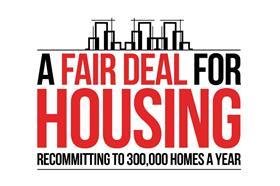New housing secretary rules out U-turn on controversial levy to pay for ‘orphaned’ blocks
The new housing secretary has ruled out a U-turn on his predecessor Michael Gove’s plan to raise a new £3bn planning levy on the industry to pay for fire safety remediation works.

Greg Clark said there will be no “backsliding on the £3 billion building safety levy”, announced to outrage from the housebuilding sector in April, but that he nevertheless wanted to create a “productive partnership between housebuilders, the government, local councils and housing associations.”. The proposed £3bn levy would fund works on ‘orphaned’ buildings – those where the owner cannot be traced or contacted – above 11 metres in height.
He made the announcement while also giving housebuilders a month to sign up to the full legal documentation, published this week, drawn up to sit behind the £2bn “cladding pledge” made by many of the largest builders to fix their own buildings in March.
Clark said he was publishing it in order to consult the sector on the detailed drafting of the pledge, under which housebuilders have committed to repair all defects on homes built by them going back 30 years without recourse to public funding but expected it “to be signed within a month”.
Greg Clark’s statement over the £3bn Building Safety Levy comes after cladding campaign groups raised concerns that the Home Builders’ Federation (HBF) wrote to Clark calling for the levy to be scrapped within days of his appointment last Thursday.
Housing Today revealed on Monday that Clark also spoke personally to the HBF within the first days of taking up the job – something his predecessor Michael Gove had refused to do, sparking fears from cladding campaigners that he was about to reverse Gove’s policies.
The HBF has lobbied the government strongly against the introduction of the Building Safety Levy, which comes on top of £2-3bn raised by the Residential Property Developer Tax, and a contribution of at least £2bn by the industry under the terms of the cladding pledge.
The HBF said the government should look to other market participants – such as foreign-owned developers, product manufacturers and contractors – to make an equal contribution.
Housing Today’s A Fair Deal for Housing campaign – which calls on ministers to re-commit to the 300,000 homes a year manifesto pledge – also says government must “urgently find ways of ensuring that other parts of the industry” beside housebuilders, contribute to costs to resolve the fire safety crisis.
Greg Clark said: “The levy will be raised against all qualifying projects in England, and companies and firms who headquarter themselves overseas will pay it, as well as home-grown developers. Ensuring that this funding is available to all affected buildings is essential to re-building confidence in the sector.
He added: “During the months and years ahead, we have an opportunity to have a productive partnership between housebuilders, the government, local councils and housing associations. I want to increase housebuilding and the most straightforward way is with existing housebuilders.
Neill Jefferson, managing director of HBF, said: “UK builders have now committed £5bn to remediate buildings and yet another levy would be disproportionate. Ministers need to do more to chase other parties including foreign builders and material providers, rather than taking the easy option of targeting UK businesses again to pay for buildings they did not develop.”
Jefferson added the desktop analysis used by the government to estimate how many orphaned buildings need remediating and how much it will cost “needs to be more precise”.
A Fair Deal for Housing

Housing Today believes the government should not back away from its manifesto pledge of building 300,000 new homes a year by the middle of the decade. We badly need more homes, and a lack of supply is a major factor in creating problems of affordability for both buyers and renters.
Over the next few months, Housing Today will be exploring potential solutions to help us ramp up housebuilding to 300,000. These are likely to include different ways of working, funding asks of government and policy ideas that could boost housebuilding.
We want to hear from you: what do you think can make a difference at a policy level?
What can the industry do better?
We believe that, with the right commitments from ministers and the industry, it is possible to build more homes and help the government to meet its objectives to “build beautiful”, improve quality and safety, boost home ownership and level up the UK.











No comments yet